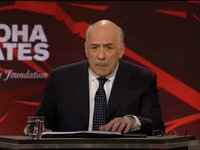This House believes that Arab states should hand over the Sudanese president to the International Criminal Court
Monday April 27 2009
MOTION PASSED
by 55% to 45%
Transcript
Order of speeches
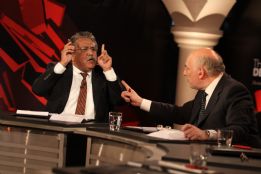
- Introduction
- Ahmed Hussain Adam
- Roland Marchal
- Hani Shukrallah
- Ghazi Salahuddin Atabani
- Audience questions
- Vote result
Introduction
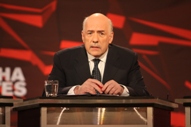 TIM SEBASTIAN
TIM SEBASTIAN
Ladies and gentlemen, a very warm welcome to the latest in our series of Doha Debates coming to you from the Gulf state of Qatar and sponsored by the Qatar Foundation. In March, judges at the International Criminal Court, were handed an arrest warrant for Sudan's president Omar Hassan Al Bashir, the first time this has happened to a sitting head of state. He stands accused of war crimes and crimes against humanity, which he denies. But the indictment has divided opinion around the world. Many are calling for the president's immediate arrest. Others, including the Arab League, reject the charges against him. One official called the court "a mechanism of neo-colonialist policy used by the West against free and independent countries." Well, our motion tonight stands at the heart of the controversy: 'This House believes that Arab states should hand over the Sudanese president to the International Criminal Court' and our speakers reflect the sharp divisions over this issue. Speaking for the motion, Ahmed Hussain Adam, for six years the main spokesman for the most active of Sudan's rebel groups, the Justice and Equality Movement. He was one of its main negotiators in talks with Sudan's government here in Doha in February where the two sides agreed on a declaration of intent to try to end the conflict in Darfur. With him, Hani Shukrallah, head of Egypt's Heikel Foundation for Arab Journalism. He's also a founding member of the Egyptian Organisation for Human Rights, and a consultant to the Al-Ahram Centre for Political and Strategic Studies, one of the leading think-tanks in the Middle East. Speaking against the motion, Roland Marchal, senior research fellow at the Centre for Study and International Research at Sciences Po in Paris, and an expert on politics and conflict in Africa. He's written extensively on Darfur, Chad and Somalia. And with him, Ghazi Atabani, an advisor to Sudan's president, and a member of both parliament and the Leadership Council of the National Congress Party. He has wide experience at the highest levels of government, including such posts as Minister of Communications and Minister of Information. Ladies and gentlemen, our panel. [Applause]. So now let me first call on Ahmed Hussain Adam to speak for the motion.
Ahmed Hussain Adam
Speaking for the motion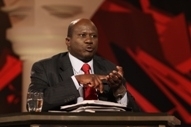
AHMED HUSSAIN ADAM
I thank you and good evening, everyone. Thank you, Tim, for availing me this opportunity and I'm grateful to you and to your entire team for bringing this important issue to attention, to discussion, to dialogue with this important and serious, dedicated audience. I'm very much in favour of this motion. I strongly support this motion, that the Arab states should hand over Al Bashir to the International Criminal Court, because I believe that Al Bashir has committed war crimes and crimes against humanity, and he should be accountable and held accountable before the court of law, and the only court of law, the only legal organ which can prosecute Al Bashir is the International Criminal Court, because in Sudan you cannot do this job because Al Bashir is in control of everything and we don't have any laws actually which proscribe war crimes and crimes against humanity, and I think that to prosecute Al Bashir before the International Criminal Court is a good thing, is good for the people of Darfur, good for the Sudan, good for the entire world. I think that this is the only way that we can fight and combat the impunity, this is the only way that we can send strong messages to dictators and human rights violators around the world, and this is the only way that we can respond positively to the victims right now who are watching us here, watching the result of this debate, and I believe that and I urge the audience to support this motion because it is good for our people and it's good for the Arab world, it's good also for Africa, and I think that it is a good thing to do because you cannot leave these people actually to kill us in the name of sovereignty, in the name of domestic jurisdiction and also killing us in the name of fighting the Western conspiracy. I think the indictment of Al Bashir will be a good thing to do because we are going to have a better world without a dictator like Al Bashir. Thank you very much.
TIM SEBASTIAN
Ahmed Hussain Adam, thank you very much. I'm puzzled by your stand. On the one hand you sit down with President Bashir's administration to talk peace and on the other hand you want him carted off to the International Criminal Court. If he was carted off, who exactly would you be talking peace with?
AHMED HUSSAIN ADAM
Because peace is our strategic option, and we sat not with Al Bashir, we sat with the government ...
TIM SEBASTIAN
Well, you sat with his administration.
AHMED HUSSAIN ADAM
We sat with the government of National Unity actually that composed of the SLPA...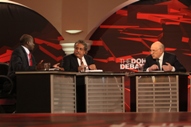 TIM SEBASTIAN
TIM SEBASTIAN
Directed by him, carrying out his wishes..
AHMED HUSSAIN ADAM
Well, I think that is the dilemma actually, but ...
TIM SEBASTIAN
It's more than a dilemma, isn't it? It's a major problem. You break off peace talks in the middle to have him carted off to the ICC, you've got nobody left to talk to. The peace process falls apart, doesn't it?
AHMED HUSSAIN ADAM
We suspended our participation in the talks because Al Bashir violated the very agreement which we signed with him here in Doha. We signed that agreement for him to stop the obstruction of humanitarian assistance. Instead actually he expelled the aid workers and humanitarian organisations and others from Darfur which used to provide about 60 percent of the ...
TIM SEBASTIAN
So you're not even talking peace now. Your desire for peace, your declaration of intent didn't last very long, did it,if you've broken off the talks already?
AHMED HUSSAIN ADAM
No, we are committed to that declaration of intent, but the other side actually violated that ...
TIM SEBASTIAN
How can you be if you've broken off the talks? Who are you talking to now? Nobody.
AHMED HUSSAIN ADAM
No, we are not talking to them right now because they are violating that agreement and because right now they are starting a new phase of genocide against our people by using food as a weapon in this conflict. Imagine that - how can we come to talks while Al Bashir is expelling all the humanitarian organisations which provide 60 percent of the material assistance? Our people will never respect us if we come here to negotiate with Al Bashir while they are dying in the IDP camps.
TIM SEBASTIAN
But you take away the man who is at the centre of power there, in the middle of a war, in the middle of a major humanitarian disaster, perhaps the world's worst ongoing humanitarian disaster, and you don't expect the country to fall apart as a result? You're gambling with the lives of tens of millions of people.
AHMED HUSSAIN ADAM
No, the one who is gambling is Al Bashir. The one who...
TIM SEBASTIAN
You don't know what the result is going to be, do you? If he's arrested now or in the next six months, you don't know what's going to happen. I don't, but you don't either.
AHMED HUSSAIN ADAM
I think the rest of Sudan will be a better place actually, and actually if the international communities stand against Al Bashir instead of appeasing Al Bashir for expelling these humanitarian organisations - I think Al Bashir should be punished for this act, because this is a real violation and clear violation of international humanitarian law.
TIM SEBASTIAN
Ahmed Hussain Adam, thank you very much indeed. Now please let me call on Roland Marchal to speak against the motion.
Roland Marchal
Speaking against the motion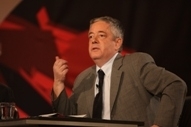
ROLAND MARCHAL
Huge violations of human rights have been committed in Darfur, and certainly the Sudanese government bears the main responsibility for those acts. The ICC decision is certainly an acknowledgment of the suffering of those people. We have to keep that in mind. Nevertheless, I would be against the motion for three very different reasons. The first one is a reflection of international justice today, and I underline ‘today'. I believe in the past international justice used to be based on co-operation. Today in 2009, with the ICC, it's based on coercion, so we have to question the legitimacy of an institution that nevertheless allowed three permanent members of the United Nations Security Council, plus their close allies - no need to give names here - to be out of this jurisdiction. As a consequence, of the 138 complaints to the ICC made by civil society, human rights activists, civil society organisation, human right activists, the ICC has been only considering a few - always in Africa - so does that mean that Africa has the monopoly of impunity? Furthermore, we have to look at the ICC as it is, which means a very young institution, full of potential, but as well that multiplied blunders, mistakes, and maybe wrong political choices over the years, not only on Sudan but even on DRC or Northern Uganda, and I believe that this institution is maybe not as mature as to exercise its mandate today. Its political expertise is really very low, especially on Africa. And then the main point is that ICC shouldn't intervene while the conflict is still on. Certainly we could see room for the ICC to play a role within transitional justice, when the conflict got a settlement, where the situation is cooled down, when people could reflect on actually what happened among them. So to say it in a very provocative way, I do not believe that there is peace without justice. There is no peace without justice. The third aspect is the current situation of Sudan. People were supporting the indictment of President Bashir so that it will lead to a major improvement in talks, and as well as the global, the overall political situation in Sudan, 13 international NGOs have been expelled, Sudanese human right activists and journalist have been arrested, and we don't see that the regime is going to show very much flexibility in the near future. On the other side, as we just witnessed, the insurgency is getting more irrealistic about what it could get from this situation. Many...
TIM SEBASTIAN
Could we come to an end please.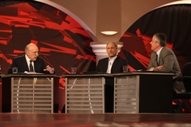 ROLAND MARCHAL
ROLAND MARCHAL
Yes. Many believe that actually this is, the ICC decision is just a further step towards regime change, and of course this doesn't help to find a settlement in Darfur. And then I would like to conclude saying the decision, the ICC decision, may actually make, for the people of Darfur who have been fighting for or against the Khartoum government... you know, more difficult to co-exist after this conflict has found a solution.
TIM SEBASTIAN
Roland Marchal, thank you very much indeed. You say the ICC shouldn't intervene. You know perfectly well that the ICC was asked to intervene by the Security Council, that there were no votes in the Security Council against. There were eleven votes for, and four abstentions. So the ICC was asked to intervene, it didn't take the court on. Why do you have a problem with that?
ROLAND MARCHAL
I have a problem because first, it was a very tactical move, which means that at that time, which means in March 2005, the talks between the Khartoum government and the rebels were going nowhere. It was a way to pressure Khartoum, so to use the ICC ...
TIM SEBASTIAN
Who says it was a way to pressure Khartoum? You do. There had been a Security Council... there had been a UN investigation, it had gone through a normal UN process: investigation to the Security Council, the Security Council recommends it to the ICC. What's your problem?
ROLAND MARCHAL
My problem is again, as I said, that this resolution was passed at a time when the discussion were basically blocked, and without reflecting on long-term consequences on the conflict. Nobody at that time thought that President Bashir will be indicted. People saw that it was a way to get a quick fix on Darfur - it wasn't. The Abuja Agreement that came a year after was basically a failure.
TIM SEBASTIAN
And you complain that it's dealing with too many African subjects.
ROLAND MARCHAL
I do not complain. I just ...
TIM SEBASTIAN
It's African countries that are referring the cases to the International Criminal Court. Three out of four of the cases that it's currently dealing with were passed to it by African countries, at the request of African countries.
ROLAND MARCHAL
Yes, 138 complaints, sir. I doubt that all of them were from African stakeholders.
TIM SEBASTIAN
There are 30 members signed up, out of 108 members of the court, 30 members from Africa.
ROLAND MARCHAL
Yes, of course, I'm not denying that.
TIM SEBASTIAN
Five of the 18 judges.
ROLAND MARCHAL
What I'm saying is, a lot of NGOs tried to raise the attention of the ICC on other cases out of Africa and what they've been witnessing...
TIM SEBASTIAN
It's one thing to raise attention, it's another thing to have a workable case, isn't it? And you're not in a position to judge because you didn't see the evidence.
ROLAND MARCHAL
If you want.
TIM SEBASTIAN
Roland Marchal, thank you very much indeed. Now let me ask please Hani Shukrallah to speak for the motion.
Hani Shukrallah
Speaking for the motion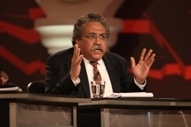
HANI SHUKRALLAH
Thank you. Good evening. Obviously I support the motion to hand over the Sudanese president to the International Criminal Court for trial on crimes against humanity and war crimes. My reasons are many, but I will try to put some of them, my most salient and the most important of these very briefly. The first point is that I feel the Arab states, the Arab world as a whole, is obliged to make amends, to atone for the shame of having stood by and seen the massacres that were going on in Darfur and turned their back as crimes - horrific crimes - of murder, of mass murder, of mass expulsion of a whole population, of rape, of murder of children and women and so on, and having stood by and turned their back to this, as this massacre was happening, and I see no reason why we should be outraged, rightfully outraged, at what Israel has been doing in the West Bank and Gaza, the Israeli invasion in Gaza just lately... We are rightly outraged at Israeli massacres but I see no reason why we should not show the same kind of outrage at massacres that are being done by Arabs against their fellow citizens. This is totally indefensible. The second reason is that when we accuse the West of double standards, we really have very little credibility when we exercise such a flagrant double standard in our own backyard. Thirdly, I think we have a stake, we have a decided stake in defending, in advocating, and in advancing human rights law, international humanitarian law, and international law. I think a world without law - especially after eight years of George Bush, I think we all realise this - a world, a lawless world, a world where international human rights law is being violated with impunity is a jungle, is an unbearable world to live in and I think if we want to have any kind of... this is a standard, human rights law especially, or international humanitarian law is one of the supreme embodiments to my mind of the moral development of humanity and we have a decided stake in defending this and advancing its cause.
TIM SEBASTIAN
All right, Hani Shukrallah, thank you very much indeed. Arab governments didn't turn their back on Darfur, did they? In fact the Arab League in 2004 sent an investigative team to find out exactly what had happened, which reported on gross violations of human rights, so they didn't turn their backs, did they?
HANI SHUKRALLAH
You're quite right. This is the one bright spot..
TIM SEBASTIAN
So it's not a fair accusation.
HANI SHUKRALLAH
No, no, no, it's a fair accusation because, let me tell, the massacres were happening, no-one knew about them. We started looking at what's happening once the international community, you know, said: "Something is happening in Darfur," and we started looking at Darfur because we felt this is an opening for international intervention, everybody is, in the Arab world, is obviously very wary and very scared about international intervention. The one bright spot, what you mentioned is the one bright spot in the whole Arab treatment of the Darfur issue...
TIM SEBASTIAN
And isn't it also true ...191x127.jpg) HANI SHUKRALLAH
HANI SHUKRALLAH
...and this report was buried.
TIM SEBASTIAN
OK. Isn't it also true to say that there has been growing disenchantment with the regime in the Sudan? At the Arab League meeting in 2006 in Khartoum, half the members didn't turn up. An arrest warrant is simply counter-productive. It forces the Arab states to rally round somebody they're not necessarily wanting to rally round at all. It's counter-productive. It's producing exactly the opposite results from the ones that you're seeking, isn't it?
HANI SHUKRALLAH
Well, you're partially right, but I think just partially right, because you see ...
TIM SEBASTIAN
I don't normally get admissions as large as that.
HANI SHUKRALLAH
No, no, no, no, no. The issue here is, was a crime committed or not? Were there gross violations of human rights or not?
TIM SEBASTIAN
Actually what we're debating is whether the Arab states should hand Bashir over to the International Criminal Court.
HANI SHUKRALLAH
Yes, indeed, indeed. It is in the interests of the Arab states, since a lot of them, you know ...
TIM SEBASTIAN
Then why not defer it in the interests of peace and security...
HANI SHUKRALLAH
It's in the interests of the Arab people, definitely, and of the Palestinian people which is a supreme cause of the Arab people today ...
TIM SEBASTIAN
Article 16 of the ICC's Rome Statute gives the Security Council the power ...
HANI SHUKRALLAH
... that international humanitarian law is upheld, that gross violations of human rights should be punished, that war criminals should be punished. If I want to punish Sharon, if I want to punish Olmert, if I want to punish Barak, then I must punish Bashir. I have to have one standard.
TIM SEBASTIAN
All right, Hani Shukrallah, thank you very much indeed. Now let me please ask Ghazi Atabani to speak against the motion.
Ghazi Salahuddin Atabani
Speaking against the motion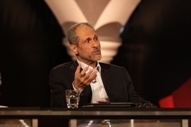
GHAZI ATABANI
Well, I think if the Arab countries went ahead with this motion, they would be setting a very serious precedent in a world that is being increasingly discriminatory and lop-sided, so I'm against the motion for three reasons. The first reason is that the case itself is a very weak case. We all know that the prosecutor of the ICC has never set foot in Sudan, has never set foot in Darfur. He has to do his evidence, he had to collect his evidence by proxy, so he asked people to collect evidence for him. Actually his evidence is very flimsy. Some of his testimonies are dubious, and that's not the way to indict or to prosecute the president of a nation. The second reason why I'm against the motion is that the ICC itself, as an institution, is being increasingly seen as an instrument of politics rather than an instrument of justice, and that's very important. It's not a question of referring someone to the institution such as the ICC, it's whether the institution is well equipped to administer justice or not. It is not. It is an institution that is being used increasingly against the poor and the helpless because the strong and the mighty, they protect themselves, they shield themselves behind the safety of their permanent membership in the Security Council. The third reason why I'm against this motion is that in a hard-won peace, which took us in Sudan 50 years to achieve, if you take the most central figure who's the custodian of the peace, who's the guardian of the peace, if you take him to court on such a flimsy case, flimsy evidence, you are derailing the peace process, you are further jeopardising the people in Sudan and that's why you shouldn't do it that way. If you are talking about justice, there are other ways of administering justice.
TIM SEBASTIAN
Ghazi Atabani, thank you very much indeed. You say that the ICC is being used against the weak countries. I want to draw your attention to what the Deputy Prosecutor said the other day. She's a lady called Fatou Bensouda, she's from the Gambia, and she says: "A month ago, the ICC decided that Omar Al Bashir should be arrested to stand trial for crimes of rape, extermination and killings." As an African woman and as Deputy Prosecutor, she said: "I am dismayed by suggestions the court is targeting Africans. This court is defending African victims and will continue to do so." She doesn't share your view, of being used by the powerful. She doesn't come particularly from a powerful country, does she, the Gambia?
GHAZI ATABANI
Let the facts and the numbers speak. The actual, the fact of the matter is that only African individuals are being prosecuted or indicted by the ICC. Not a single person outside Africa is being indicted or prosecuted by the ICC.
TIM SEBASTIAN
Well, if Africa and the weak countries were complaining about that, why was it that this year alone 12 African countries proposed judges to the court? 30 of the 108 nations who signed up to the court are from Africa.
GHAZI ATABANI
That's true, that's true.
TIM SEBASTIAN
So where are these neo-colonialists that your government is complaining about when it's talking about the court?
GHAZI ATABANI
When they decided to introduce a linkage between the Security Council and the ICC, that was where it went wrong.
TIM SEBASTIAN
The ICC remains independent.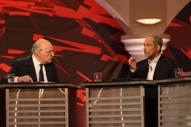 GHAZI ATABANI
GHAZI ATABANI
It's not.
TIM SEBASTIAN
You know that. You know that.
GHAZI ATABANI
It's not, it's not, because cases are referred to it by the Security Council.
TIM SEBASTIAN
That doesn't mean that it doesn't have independence.
GHAZI ATABANI
Yes, because the Security Council is the most politicised institution in the world. You know the Security Council, members are not equal. Some members are permanent, some members have veto power, so the members who have veto power shield themselves and their properties and their friends.
TIM SEBASTIAN
Nobody as you know voted against sending the case of your president to the International Criminal Court.
GHAZI ATABANI
That's exactly my point.
TIM SEBASTIAN
Not one of the 15 members.
GHAZI ATABANI
That's exactly my point. It shouldn't have been referred from the Security Council because the Security Council is not an impartial body, it's a politicised body.
TIM SEBASTIAN
Containing countries like Tanzania, the Philippines, Argentina, Romania...
GHAZI ATABANI
It doesn't matter.
TIM SEBASTIAN
... Greece.
GHAZI ATABANI
It doesn't matter. That's the crux of the problem. The problem is ...
TIM SEBASTIAN
You would be complaining whoever had sent the case, wouldn't you? Let's face it.
GHAZI ATABANI
No, because it was the Security Council who sent the case. It shouldn't have been sent by the Security Council. The Security Council, in the charter of the United Nations, when we became members of the United Nations, no-one told us that there would be an institution called the ICC that cases would be referred to from the Security Council.
TIM SEBASTIAN
Briefly, why wouldn't your president want to have his day in court? He faces some of the most serious charges that can be levelled at anybody on this planet. If he's innocent, as you say and he says, why wouldn't he want his day in court to clear his name?
GHAZI ATABANI
Because in the second reason I mentioned, I have claims about the neutrality and the impartiality of the court. I have objections to the court.
TIM SEBASTIAN
If he's innocent, he shouldn't have a problem clearing his name.
GHAZI ATABANI
Well, if he's innocent and the court is not innocent, they won't judge him as innocent. That's what I'm saying.
TIM SEBASTIAN
Ghazi Atabani, thank you very much indeed. Let me just remind you all of the motion: "This House believes that Arab states should hand over the Sudanese president to the International Criminal Court." I'm going to take your questions now. Gentleman in the third row, you sir.
Audience questions
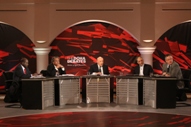 AUDIENCE (M)
AUDIENCE (M)
Thank you very much, Mr. Tim Sebastian. I have a question to the side for the motion.
TIM SEBASTIAN
Where are you from?
AUDIENCE (M)
I am Ahmed Abdullah, I'm from Kenya.
TIM SEBASTIAN
From Kenya.
AUDIENCE (M)
Yes. So, sticking by the rule of law, is there any place in the constitution of the ICC that stipulates a president in power can be indicted? If so, could you help us in stating it? The second question is, by sending Bashir, or handing over Bashir, don't you think that it could create tension and enmity and resentment from the Sudanese people to the Arab states? Thank you.
TIM SEBASTIAN
All right. Perhaps you'd like to take that, Hussain Adam.
AHMED HUSSAIN ADAM
Yes, I think the Statute of Rome is very clear, and I think the Statute of Rome itself is a real departure from the issue of immunity, principle of immunity, because before, you know, when people in power, maybe holding any kind of official position or something, then they have immunity, you know, from prosecution, but the Statute of Rome is very clear, that regardless of any official position, any member of the government or general of the army - he has to be prosecuted if he committed certain crimes - crimes against humanity, war crimes and genocide, crime of genocide, that is very clear. And this is the main characteristic of that statute, that people in power, whoever committed any kind of crime, should be held before the International Criminal Court.
TIM SEBASTIAN
And the second question, Hani Shukrallah, about creating enmity and tension.
HANI SHUKRALLAH
No, I really doubt that Sudanese people as a whole are the same Sudanese people we've been seeing on television, shouting "Down with Ocampo!" or whatever. I mean, under a dictatorship, I've lived most of my life in a dictatorship. Most Arabs here have lived most of their lives under dictatorship, we know that demonstrations under dictatorships are not very reliable, you know, as indicating what public opinion is about, so we've seen demonstrations for Saddam Hussein before he was overthrown and we've seen Iraqis beating his pictures with shoes after...
TIM SEBASTIAN
So you think the Sudanese would be indifferent to it?
HANI SHUKRALLAH
I think invariably once dictatorships fall, you discover a different people from what you felt ...
TIM SEBASTIAN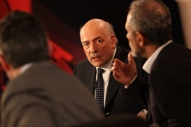 All right, OK. Ghazi Atabani.
All right, OK. Ghazi Atabani.
GHAZI ATABANI
Well, I don't see the point talking dictatorships here. You have a CPA, that's a Comprehensive Peace Agreement, you have a constitution that provides for plurality, we are having elections next year. This is a government that is recognised by the international community. You have to accept that fact. We are not talking about dictators here. The second thing is, you have nice things enshrined in the Statute of Rome, but we have to remember that the Statute of Rome is full of holes. The Statute of Rome does not see aggression or the use of nuclear power as a crime. So we have objections to the Statute of Rome. I don't think it's the most perfect statute, and the second thing is the applicability. OK, it might look nice, it might look beautiful, but in actual fact we cannot imagine in our wildest dreams the Statute of Rome being applied to an American corporal, for instance, let alone an American president.
HANI SHUKRALLAH
Were there war crimes committed or not? I mean, I really would like a Sudanese official to answer this question: were there war crimes and crimes against humanity committed in Darfur or not?
GHAZI ATABANI
You can say Bashir is a bad person and I say ...
HANI SHUKRALLAH
No, no, I'm not, let me explain to you, a very specific question..
TIM SEBASTIAN
Please let him answer it then.
GHAZI ATABANI
You could say Bashir is a bad person, I could say he's a good person. That's my word against your word. It doesn't count.
HANI SHUKRALLAH
That is not what I said.
GHAZI ATABANI
What matters is, the question is: is the house of the opinion that Bashir should be handed over to the ICC? What I'm arguing is, the ICC is not equipped and the case is flimsy, the case is weak. It's not the way to do it.
TIM SEBASTIAN
All right, we're going to take another question. Gentleman in the third row, you sir.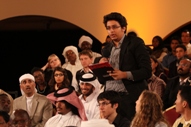 AUDIENCE (M)
AUDIENCE (M)
Thank you very much. By sending President Al Bashir to the ICC - the question's for the motion - how long do you think Sudan can stay without a president and who do you think can stay instead of President Al Bashir, and that's all, thank you very much.
TIM SEBASTIAN
Would you like to answer that?
AHMED HUSSAIN ADAM
I believe that as Sudanese we have to address this challenge. That's why we in the Justice and Equality Movement propose to have a transitional government of national unity, so to address and to fill this vacuum.
TIM SEBASTIAN
Yes, but who?
AHMED HUSSAIN ADAM
Sorry?
TIM SEBASTIAN
Who would be the president?
AHMED HUSSAIN ADAM
I think it's for the Sudanese people to decide that, but we cannot accept that a war criminal, a suspected war criminal can lead our country and... just because we don't want to change, we need to change and we need actual Sudanese people to take that responsibility.
TIM SEBASTIAN
So you just arrest him and you think you can have a normal election campaign and the normal procedures?
AHMED HUSSAIN ADAM
I think the people of Sudan...
GHAZI ATABANI
What about the CPA? How would that ...
TIM SEBASTIAN
The Comprehensive Peace Agreement, you mean.
GHAZI ATABANI
The Comprehensive Peace Agreement.
AHMED HUSSAIN ADAM
You cannot confine the CPA just for one person.
TIM SEBASTIAN
Excuse me, let Mr. Atabani say something.
GHAZI ATABANI
According to the CPA, the president is the custodian, is the guardian of the peace agreement, so you want to take him away - how do you propose to solve the problem arising?
TIM SEBASTIAN
Please, don't everybody speak at once, please. Mr. Shukrallah first and then Mr. Roland.
HANI SHUKRALLAH
Presidents die. Presidents get sick and die. I'm puzzled by this point, because you know, a president could get an embolism and die tomorrow. A country does not collapse because its president ...
TIM SEBASTIAN
OK, Roland Marchal.
HANI SHUKRALLAH
This is such a faith in dictatorship here ...
TIM SEBASTIAN
I think you've made your point. Roland Marchal, please.
ROLAND MARCHAL
The international community has been slightly schizophrenic about Sudan because on one side Sudan, or the Sudanese regime is, quote-unquote "genocidal" on Darfur. On the other side it's a good ally in the war on terror. On the third side it's a partner in the CPA, in the north-south peace agreement which is very much valued in Western capitals. So the problem is, we are talking about the same regime and it has three faces, so we have to find a way to get out of that. The ICC decision is just making all those things much more complicated and getting peace in Darfur as well as threatening or weakening peace in the north-south, a more likely scenario, so that is why the motion is not appropriate at this time.
TIM SEBASTIAN
OK. Ahmed Hussain Adam, you want to come back.
AHMED HUSSAIN ADAM
What I say is, you cannot use the entire country, the Sudanese people as the shield just to protect one person actually in Sudan, you cannot actually say that the CPA can collapse if we indict Al Bashir ...
TIM SEBASTIAN
All right, I'm going to move on and take a question from the lady in the front row there.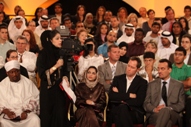 AUDIENCE (F)
AUDIENCE (F)
Good evening. I'm an Indian national but born and raised in Qatar. My question is, why aren't the powerful figures penalised in court for the crimes they have pursued which are a lot worse than what the Sudanese president is being imprisoned for?
TIM SEBASTIAN
Hani Shukrallah, would you like to take that?
HANI SHUKRALLAH
Yes. Again, I think definitely there is, where Israel is concerned, definitely there's a double standard in the West, I agree, but I do not see this as justification for us to have a double standard ourselves. On the contrary, I think it is an argument that we should uphold one standard and we should push for that one standard so that it would be applied to all those who commit crimes against humanity, to all those who commit crimes, war crimes, and in the same measure that we support the prosecution of Al Bashir for such crimes, we should support and call for the prosecution of the torturers of Abu Ghraib and of Guantanamo, we should call for the prosecution of the Israeli war criminals in Gaza and in the West Bank.
TIM SEBASTIAN
Are you happy with that answer?
AUDIENCE (F)
Yes. I am.
TIM SEBASTIAN
Ok. I would like please... sorry, Roland Marchal.
ROLAND MARCHAL
Yes, allow me. You know, the discussion on the Rome meeting and the Rome Treaty were decided at a time, you know, after the Cold War. That was the time when liberalism was prominent, paramount, both politically and economically, so there was this idea that we should embody human rights in a specific international institution. It was maybe a genuine ambition that personally I endorsed, I supported very much enthusiastically. The problem is what happened after. After we got 9/11, we got a number of economic events, crises that show that global governance is over for quite some time. We got again the emergence of a number of countries that do not see the same way the ICC [does] on human rights, and so if we want to pursue the ICC ideal, we have first to go back to basics, maybe try to convince a number of third world countries that at one point we are silent and today are opposing the ICC. If we don't get the legitimacy for international justice, there is no justice.
TIM SEBASTIAN
OK, all right. Lady in the third row. Your question is for this side of the house? Yes.
AUDIENCE (F)
Yes.
TIM SEBASTIAN
We'll get a microphone to you, if you'd kindly stand please.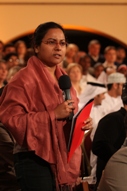 AUDIENCE (F)
AUDIENCE (F)
I'm from Bangladesh. My question is to Dr. Atabani. Actually first of all you said it's a flimsy case. I think that's a very strong thing to say considering three million people died in Darfur, that's a very, very strong thing to say that it's flimsy, it's not flimsy. Second is you said he's a good president. He's been in power since 1989 and there wasn't a time in Sudan that it was peaceful. The second civil war ended in 2004, but the Darfur conflict started in 2003...
TIM SEBASTIAN
OK, can we have a question please?
AUDIENCE (F)
I mean, if he was that good a president, what happened in all this time? And if he was that good a president, how come the Darfur thing didn't get resolved?
GHAZI ATABANI
Well, first of all I mentioned the word "good president" when I was talking to the point raised by Hani. It was beside the point. What I was saying is, beside the point, whether he's good or bad as a president.
TIM SEBASTIAN
It's not beside the point whether hundreds of thousands of people died on his watch, and 2.7 million people were displaced.
GHAZI ATABANI
That's another question, that's another question.
TIM SEBASTIAN
That's not beside the point, is it?
GHAZI ATABANI
No, it's beside the point talking about a good president or a bad president. What I'm saying is, he's a president of the Sudan according to the Comprehensive Peace Agreement, so he's a recognised president. Whether he's bad or good, it doesn't matter. What I'm saying is, the ICC is not equipped, it is not impartial to indict anyone on the case of Darfur. There are other ways of ...
TIM SEBASTIAN
She's shaking her head, she's not convinced by your argument. Let me just ask you - you have something else to say on this?
AUDIENCE (F)
Yes, in the part where you said that the ICC is impartial, the whole panel, representatives of many countries including African nations - everybody is saying that this claim is legitimate. Saying that everybody in the whole panel is impartial while the president is innocent is again a big claim, and three million people died Dr. Atabani, this is not a flimsy case. We need something stronger than that.
GHAZI ATABANI
First of all, where did you get that figure from? That figure is off the top of your head obviously.
AHMED HUSSAIN ADAM
No, no, no...excuse me...
GHAZI ATABANI
Three million people died? Three million people died in Darfur? You have to revise your information.
HANI SHUKRALLAH
Is 200,000 any better?
GHAZI ATABANI
No, no. I mean, characterising a problem ... How many people died? It's not a question of whether people should be tried or not. I'm not against justice...
TIM SEBASTIAN
Well, it is, that's what we're talking about - whether he should be handed over to the International Criminal Court.
GHAZI ATABANI
The motion is, which the other supported - do you support the motion which is handing over Bashir to the ICC. What I'm saying is that ICC is not equipped. If you're talking about justice and how to achieve your justice, then that's a different issue. We can talk about it. We can talk about the casualties, we can talk about those who died, that's a different question altogether. There are other ways of delivering justice...
TIM SEBASTIAN
OK, all right, Ahmed Hussain Adam
AHMED HUSSAIN ADAM
This conflict has been going on for six years. Al-Bashir himself has said ten thousand have died, without any remorse or any kind of regret and that's very insulting to the memory of all victims. But at the same time, for six years nobody at high level, you know, official, has been prosecuted, there is no-one resigning, there is no-one even, you know, [expressing] regret or even offering any kind of apology, for six years there's no-one prosecuted. I think this is an irresponsible government actually.
GHAZI ATABANI
That's not true. There are people being prosecuted at this very moment. You know them, there are people being prosecuted and there's a special ...
AHMED HUSSAIN ADAM
What happened to Haroun, what happed to Haroun, what happened to Kushir?
GHAZI ATABANI
What happened, it happened to so many people, that they're being tried ...
TIM SEBASTIAN
OK, I'm going to give a final word to the questioner on this and then we're going to move on.
AUDIENCE (F)
Thank you. So two hundred thousand, if it's two hundred thousand, it's less fatal than three million? It's just statistics? No. Even if it was two hundred thousand, it's fatal, and it's not flimsy.
TIM SEBASTIAN
All right, OK.
GHAZI ATABANI
Flimsy, flimsy is the evidence.
TIM SEBASTIAN
OK. I'm going to take a question from the gentleman in the front row please, you sir.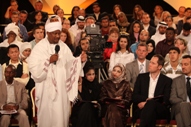 AUDIENCE (M)
AUDIENCE (M)
Salaam aleikum. I'm Hassan Suleiman from Sudan. My question is for Adam and Mr. Hani.
TIM SEBASTIAN
Could you hold the microphone please closer.
AUDIENCE (M)
OK, sorry. Adam said he wants President Bashir to be handed over to the Criminal Court because he doesn't want his people to be killed by the government. So my question to Adam is very simple. Adam, why you think Sudan's government is killing Darfur people? If as you say they're just criminals, they want to kill people, there's more people to kill in the south than the east.
TIM SEBASTIAN
All right, let him answer the question.
AHMED HUSSAIN ADAM
I think very simple, I think there is a consensus now that crimes against humanity and war crimes have been committed in Darfur, and even the Minister of Justice [inaudible] just about a week ago.
TIM SEBASTIAN
His question was why.
AHMED HUSSAIN ADAM
Why?
TIM SEBASTIAN
Why?
AHMED HUSSAIN ADAM
Because actually this is the behaviour of the government of Sudan.
TIM SEBASTIAN
Just that, they feel like it?
AHMED HUSSAIN ADAM
Because Al Bashir, he said that, you know, he said for a long time that: "I don't want captives from Darfur, I don't want war prisoners from Darfur," and this is the behaviour of the government of Sudan to impose security and military solution and not to resolve the conflict through peaceful means.
TIM SEBASTIAN
There are a million people living, from Darfur, in Khartoum, aren't they?
ROLAND MARCHAL
They are not killing people?
AHMED HUSSAIN ADAM
There are a million people from Darfur but a lot of them, hundreds of them right now are in detention, hundreds of them right now in prison, and you know that, just two weeks ago they issued a death sentence against nine people...
GHAZI ATABANI
Is JEM [Justice and Equality Movement] not killing people?
TIM SEBASTIAN
JEM is your group.
AHMED HUSSAIN ADAM
JEM is not killing people.
GHAZI ATABANI
You had an attack... last year you had an attack...
AHMED HUSSAIN ADAM
Excuse me...
TIM SEBASTIAN
Let him just say what he was going to say and then you can answer it, please.
AHMED HUSSAIN ADAM
JEM is not killing people.
TIM SEBASTIAN
I'm going to ask Mr. Atabani to say clearly what he was going to say. I don't think everybody heard it.
GHAZI ATABAN
Yes. I mean, you had an attack last year, May last year, you know that very well, and your leader boasted in front of the media that he was inside Omdurman, he was on his way. Hundreds of people were killed in that incident, that was perpetrated by JEM.
TIM SEBASTIAN
OK, all right.
GHAZI ATABANI
So you are killing people.
TIM SEBASTIAN
All right, let him answer that.
AHMED HUSSAIN ADAM
Those people have been killed actually by the security forces of Sudan, and you know that everybody, there is a consensus right now in Omdurman, in Sudan that JEM people, when they come to Omdurman they hold their obligation under international humanitarian law, and Bashir himself, they issued a..they have weapons, they could burn the entire capital but they didn't use it.
TIM SEBASTIAN
You say you didn't kill people?
AHMED HUSSAIN ADAM
We didn't kill people, we didn't kill people.
TIM SEBASTIAN
You didn't kill anybody. Please, let him finish, you made your point.
AHMED HUSSAIN ADAM
We didn't kill anyone. In the same time we are against any violation of human rights, against anyone.
TIM SEBASTIAN
All right. I'm going back to the questioner now to ask whether he's happy with what he's heard.
AUDIENCE (M)
Still Adam, my question is not yet answered, because if you're going back to this ‘Arab killing Africans' and these things, actually we are all in Sudan, we have our African roots. President Bashir himself, he's African and got his own African roots. Then he'd rather shoot himself first.
AHMED HUSSAIN ADAM
But the question has to be asked of Bashir, why he is killing the people of Darfur?
TIM SEBASTIAN
OK, Roland Marchal, you wanted to say something here.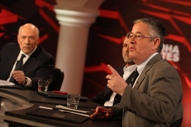 ROLAND MARCHAL
ROLAND MARCHAL
I'm sorry, I wanted to say one thing which maybe I believe is important to keep in mind. This war is not only, or is not a war from Khartoum against Darfur. It's as well a civil war in Darfur itself. You could believe that it has been to a certain extent orchestrated, organised by Khartoum, you could believe as well that Khartoum has been using local...
TIM SEBASTIAN
Do you believe that? Do you believe it's been orchestrated by Khartoum?
ROLAND MARCHAL
Partially, of course it was, but the point is, the point is, when you look at the killings, mass killings, villages which have been eradicated, it's not sure by principle, you know, without investigation, that you could put responsibilities on Khartoum or on President Bashir, so the complexity of the war, of the violence that has been used, I'm sorry to say, by all sides, not at the same level but certainly by all sides, is something that needs careful investigation and certainly not labelling as has been the case mostly by people internationally. In Sudan it wasn't possible to discuss these issues.
TIM SEBASTIAN
OK, all right. Hani Shukrallah, come back please.
HANI SHUKRALLAH
I mean, why did Serbs kill Bosnians? I think the same question applies. Essentially these are turf wars, these are wars over resources, over land, but the point in Darfur is, there is - I am sure all sides committed probably atrocities and committed violations. I haven't investigated it but I have no doubt that there were violations on all sides - but you have a more, you have a government, you have a state, you have an army, and with all the resources of a state, of an established armed force - and this is where the most heinous, the most vicious - and this I think we have the evidence to show that this happened. I wanted just to make ...
TIM SEBASTIAN
One brief point.
HANI SHUKRALLAH
Because Tim referred to something very, very fast when he was responding to my initial statement: this report by the Arab League Commission in 2004. The Arab League sent a commission to investigate the situation in Darfur and that commission wrote a report which totally indicted the Sudanese government and it accused, it found the Sudanese government guilty of war crimes and crimes against humanity...
TIM SEBASTIAN
Mr. Shukrallah, what we're talking about here, no, please, excuse me. What we are talking about here is whether the Arab states should hand the president over to the International Criminal Court. We're not going back into history. Excuse me, that is the subject I want to concentrate on. The lady up there, please.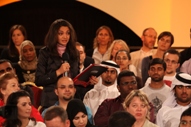 AUDIENCE (F)
AUDIENCE (F)
I'm from Iraq. I have one question to Mr. Adam. Don't you think that, don't you consider the recent co-operation with the government, Al Bashir government, here in Doha as an improvement? Aren't you, your side of the motion, going to generate a bigger problem by handing the president [over]? Thank you.
TIM SEBASTIAN
I think we've discussed that to a certain extent.
AHMED HUSSAIN ADAM
We've discussed that but also the co-operation of Al Bashir - when we came here in Doha, we signed that agreement, but that agreement hasn't been implemented till now. As a matter of fact they are violating that agreement. And they are using for a long time...
TIM SEBASTIAN
All sides violated the agreements in the past, haven't they, let's be honest about this.
AHMED HUSSAIN ADAM
But for a long time, let me tell you this, for a long time Khartoum used the negotiations, a political process, as a PR kind of exercise. They've never been serious about it. They never commit themselves to a real peaceful solution.
TIM SEBASTIAN
So tell me this: you think the situation would have improved if, when President Bashir came down the steps of his plane, the Qatari authorities here in Doha would have arrested him there and then? That would have improved the situation, would it?
AHMED HUSSAIN ADAM
I think Sudan will be a better place actually.
TIM SEBASTIAN
Roland Marchal.
ROLAND MARCHAL
In May 2006 we were in Abuja. Really we were very near to a deal. At that time a number of key Darfur movements including the JEM decided not to sign. Why? Because they saw that actually eventually they will get more because the West will support them against Bashir, so they were betting on the continuation of war.
AHMED HUSSAIN ADAM
That's not true. Let me...
ROLAND MARCHAL
The fact is that, and you could say this agreement is the signal that nobody was very serious, not Khartoum, because Khartoum wanted to negotiate with the US more than with the Darfurians; not the Darfurians themselves, I'm sorry, Tim, because they wanted regime change and not the West, because they never kept their word on what they promised if the agreement was signed.
TIM SEBASTIAN
OK, Ahmed Hussain Adam, you need to answer this.
AHMED HUSSAIN ADAM
That agreement of the DPA, it's not true, because the agreement of the DPA, the Darfur Peace Agreement, actually didn't resolve the root cause of the conflict at all and it's not just rejected by JEM, it's rejected by the IDPs and the entire people of Darfur. Nobody right now in Sudan, in Darfur, is talking about the DPA because it preserves the status quo situation and because the agreement came, when they talk of that, this agreement is not fair, but you have to take it because you ...
TIM SEBASTIAN
All right, we've got the point, thank you very much indeed. You sir, do you have a question for this side? You do. Please, let's have your question.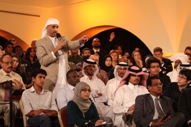 AUDIENCE (M)
AUDIENCE (M)
Good evening, my name is Mohamed from Yemen. My question to the proposition against the handing over President Bashir, Dr. Atabani, don't you believe that the Arab leaders who will be handing over supposedly President Bashir are actually handing over themselves, because they have a history similar to that of President Bashir. The other part which I just want to finish to this side is, why is the dirty work is always given to Arab leaders to implement the ICC or the ...
TIM SEBASTIAN
Let just stay with that, the first part of the question. Ghazi Atabani, easy question for you.
GHAZI ATABANI
Yes. Well, I think it's a fact worth looking into, that out of 22 countries, 19 countries, Arab countries, have decided consciously not to sign up to the agreement of the Rome Statute, that's very significant, because they don't feel that it is an impartial institution, they don't view it as an instrument of justice.
TIM SEBASTIAN
You know the Arab League has been working with the International Criminal Court?
GHAZI ATABANI
But they don't recognise it. As an Arab League, that's different.
TIM SEBASTIAN
Excuse me, could I just make a point. Excuse me.
GHAZI ATABANI
You're talking about two entities.
TIM SEBASTIAN
They are working with it.
GHAZI ATABANI
You're talking about two legal entities.
TIM SEBASTIAN
We're talking about the Arab League.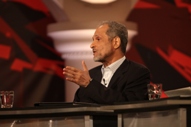 GHAZI ATABANI
GHAZI ATABANI
The Arab League is an entity in itself. You're talking about individual countries which are sovereign countries which have decided consciously not to join the ICC.
AHMED HUSSAIN ADAM
You know, Tim, these people contradict themselves. You know what, sometimes they are rejecting the ICC jurisdiction but at the same time they are dealing with the ICC by the back door. Last month they gave a QC in London one million dollars to make an application to the ICC to say that ...
TIM SEBASTIAN
OK, I don't know about that. Let me just go back to the questioner. You had a second part to your question : "Why is it that the Arab leaders are always
asked to do the dirty work?"
AUDIENCE (M)
Yes, Arabs have been always fighting at the international level to get some empowerment to become an effective party of this international community. Why is it always when there is dirty work to be done, whoever mandates it, it comes to the Arab world to implement?
TIM SEBASTIAN
Hani Shukrallahi thinks not.
HANI SHUKRALLAH
I really don't, but let me, first of all make another point..
TIM SEBASTIAN
No, please, just answer the point he's made.
HANI SHUKRALLAH
I have to make a point that neither Israel nor the United States are signatories to the Rome Statute.
TIM SEBASTIAN
OK, you've made that point, now please answer the question.
HANI SHUKRALLAH
OK. What kind of dirty work have the Arabs been asked to do other than facilitate the invasion of Iraq? I mean, they've done that, and what else? And they're not about to deliver, I think to surrender Al Bashir ...
AUDIENCE (M)
I want to remind you of the fact that twelve years of siege against Iraq was orchestrated by America and the Arab world was asked to participate effectively.
HANI SHUKRALLAH
You're quite right.
AUDIENCE (M)
And the recent example is Gaza, where Gaza was totally sealed and all Arabs are guilty of that, and where thousands of people were massacred in front of your eyes.
HANI SHUKRALLAH
I agree. But you feel the crimes that were committed by Israel in Gaza, which were facilitated by certain Arab states or at least not countered by a number of Arab states - aren't these crimes equal to the crimes that were committed in Darfur by Al Bashir? I mean, this is the point.
TIM SEBASTIAN
But we're not here to discuss Israel at the moment.
AHMED HUSSAIN ADAM
But I want you to answer me, who is the victim for the people of Darfur? Who's going to save them, who's going to serve them justice?
AUDIENCE (M)
Who makes that distinction? On what differentiation can you make between Darfurians and Gazans? They're the same people. People are people.
TIM SEBASTIAN
You've made your point, thank you very much. You've made your point. I'm going to take a word from him and then I'll come to you. Ahmed Hussain Adam, one point and then I'm going to Roland Marchal.
AHMED HUSSAIN ADAM
This is real double standards actually, because my question is, who is going to serve justice for the people of Darfur, the victims of Darfur, who's going to serve justice for seven hundred thousand who are refugees right now in Chad?
TIM SEBASTIAN
OK.
AHMED HUSSAIN ADAM
Who's going to serve justice for 4.5 million right now in Darfur?
TIM SEBASTIAN
We've got your point. Roland Marchal.
ROLAND MARCHAL
Two things. First in preparing for this programme, we discuss why it should be the Arab states and basically that was something brought by the place more, because it should be seen as an international obligation. Why? Not because of the wrong status, but because the resolution that asked the ICC to look on Darfur has been passed under Chapter 7 of the United Nations. Now, the question you have to raise is, how many resolutions passed under Chapter 7 by the Security Council are not respected by permanent members, members of the Security Council and members of the General Assembly? You will find quite a lot.
TIM SEBASTIAN
Do two wrongs make a right?
ROLAND MARCHAL
But it shows how many standards we have - certainly not one.
TIM SEBASTIAN
Gentleman in the second row.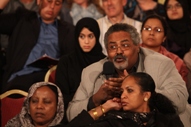 AUDIENCE (M)
AUDIENCE (M)
I'm Hassan Ibrahim from Sudan. I believe that the issue is the suffering of the people of Darfur. Nobody should belittle the suffering and the crimes of Israel and that is a totally different point. My problem is, you're asking Arab states to hand over Al Bashir. That is not the job of the Arab states, that's the job of the Sudanese people, number one. Number two, all Arab countries didn't move a muscle when the people of Darfur were butchered and massacred since 2003. They don't care two cents about the fate of Darfur.
TIM SEBASTIAN
Can we have a question?
AUDIENCE (M)
And that is my problem. My question is, when are we going to see international responsibility? And don't you think the complicity of the super powers like I mean the US and other countries that actually sent envoys enticing President Bashir and encouraging him. I mean, is this complicity from the international community...
TIM SEBASTIAN
You asked your question, please, just come to the main question.
AUDIENCE (M)
I come to the question please, Mr. Sebastian, because I need to make a point. I'm sorry. I need to make a point. My point is ...
TIM SEBASTIAN
Well, you don't need to. I'm going to let you make a point but a brief one.
AUDIENCE (M)
Thank you very much. Thank you, that's very gracious, very gracious. I thank you.
TIM SEBASTIAN
There are a lot of people who want to make points. We're here to answer questions.
AUDIENCE (M)
Thank you, thank you. My question is: do you think there is some tacit agreement between the US and the Sudanese government not to hand over President Bashir or not?
TIM SEBASTIAN
OK. Ghazi Atabani.
GHAZI ATABANI
No, there is nothing of that sort. Of course something which could mislead you is that Sudan has a position regarding the ICC. It so happens that the United States has more or less the same position. They have, they think that it is too politicised, but we have to remember countries as important, as significant as Russia, China, India, many countries have the same objection. They think it is too politicised and that's the only concurrence.
TIM SEBASTIAN
The Russian delegate at the Security Council voted to send the case to the International Criminal Court...
GHAZI ATABANI
That's the hypocrisy.
TIM SEBASTIAN
...you know that.
GHAZI ATABANI
We know that three of the five permanent members were not signatory to the agreement, which means they are objecting to the agreement and they decided to send Sudan, I mean, Sudan cannot be responsible, held responsible for that..
TIM SEBASTIAN
All right, no please, I want a point from this side.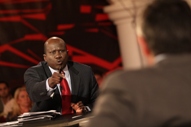 AHMED HUSSAIN ADAM
AHMED HUSSAIN ADAM
You know, having the ICC politicised or something, that didn't give any kind of excuse actually for these people to commit crimes in Darfur and still committing this crime. This is number one. Number two ...
GHAZI ATABANI
The problem is, you are committing crimes.
TIM SEBASTIAN
Let him just finish his second point and then you come to it.
AHMED HUSSAIN ADAM
Number two, these people actually, they accepted the 1593 resolution, they accepted, and Dr Ghazi gave an interview for the government newspaper, he said that he blamed the government of Sudan for accepting that resolution. That resolution is very important.
TIM SEBASTIAN
Roland Marchal, very briefly.
ROLAND MARCHAL
One point I want to mention to you is: what is at stake is not only the suffering of Darfur people, it's the suffering of the situation for the whole population of Sudan, so the move on the ICC may have consequences much beyond Darfur, and this is the point we have tried to raise.
TIM SEBASTIAN
All right. No, I'm going to move on and I'm going to take a question from a lady in the third row.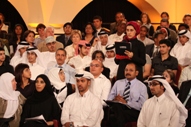 AUDIENCE (F)
AUDIENCE (F)
Good evening. I'm from Canada. My question is addressed to those who are speaking for the motion. If human rights discourse is based on Western liberalist philosophy, isn't your position culturally inappropriate and essentially a neo-colonialist one?
TIM SEBASTIAN
Do you have a neo-colonialist position, Hani Shukrallah?
HANI SHUKRALLAH
Is torture culturally specific? Is rape culturally specific? is murder culturally specific? I think, you know, I'm an Arab and a Muslim, I don't like to be tortured, I don't like my children to be killed, I don't want my wife or my mother or my sister to be raped.
AUDIENCE (F)
Rape and murder in cases of..
TIM SEBASTIAN
Please give him a chance to respond.
HANI SHUKRALLAH
This is what we're talking about, this is a humanitarian law, this is, we're speaking about international humanitarian law to which all cultures have contributed. I think we as Arabs and Muslims as much as any Christian or atheist in Europe or America should deplore torture, should deplore murder, should deplore rape.
TIM SEBASTIAN
OK, I want to hear from the questioner again. You had something to say about this?
AUDIENCE (F)
I was saying that rape and murder in cases of war are completely different from regular instances, so ...
TIM SEBASTIAN
They're all war crimes, what do you mean?
AUDIENCE (F)
Pardon me?
HANI SHUKRALLAH
Do you support murder of Gazans ...
AUDIENCE (F)
Personally I'm playing the devil's advocate, I agree with you, but I'm ...
TIM SEBASTIAN
OK, thanks for admitting that. Right, we're going to move on to a gentleman in the sixth row there, you sir. Could we have a brief question please?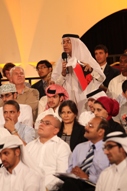 AUDIENCE (M)
AUDIENCE (M)
Yes please. I am Hassan al-Jefari, I am Qatari, a human rights activist. I wrote a letter to the Minister of Foreign Affairs in Qatar two days prior to the arrival of Bashir to stop issuing him a visa to come. (Applause) My question to those speaking against the motion: "Why only those dictators supporting Al Bashir?" Another question.
TIM SEBASTIAN
No, let's just deal with that one.
AUDIENCE (M)
OK, only last question, last question I want to ask: Why not even ... I wrote that letter and I wrote 600 copies to all over Qatar and 50 percent of the Sudanese read this letter. Not even one complained about it.
TIM SEBASTIAN
OK, thank you very much, we have your question.
AUDIENCE (M)
I am Hassan al-Jefari, thank you.
GHAZI ATABANI
Well, actually, those who showed support to President Bashir were not the dictators of the world. It was evident, the masses in many Arab countries expressed their support, and that was very visible. The second thing is, Sudan is being supported by the African Union, if you recognise that institution, it's being supported by the Arab League, it's being supported by the Group of 77, it's being supported by the Non-aligned Movement, it's being supported by the Caribbean and Pacific countries, actually even within the Security Council, quite a number of members of the Security Council are supporting Sudan, so you're not talking about an isolated dictator here who's being supported by other dictators.
TIM SEBASTIAN
I'm going to go back to the questioner here and then the panel. Please.
AUDIENCE (M)
I'm not happy with what you said. Only those, are you talking about Africans, those who took instructions from Gadaffi to support. When you talk about civilised countries and developed countries and countries which have a reputation in human rights, those who never have been supporting Al Bashir, what he did. I'm talking about ...
TIM SEBASTIAN
OK. I'm going to let Roland Marchal ...
AUDIENCE (M)
All violators of human rights should be taken to court, either in Gaza or in any part of the world.
ROLAND MARCHAL
I'll give you an answer if you allow me.
TIM SEBASTIAN
Thank you, thank you very much, I'm going to ask Roland Marchal.
ROLAND MARCHAL
Just I give you three countries, OK? South Africa is a dictatorship, just read the newspapers. Is Ghana a dictatorship? Again, look - elections last year, they were exemplary. Is Benin, Benin I'm sorry is a French-speaking country, is a model for a democracy in Africa.
TIM SEBASTIAN
Please sit down. Excuse me, sir, we've answered your question, I'm going to take one more point from this, then will you please sit down.
AHMED HUSSAIN ADAM
He's talking about South Africa. Wait for Jacob Zuma, Jacob Zuma is coming and he's never going to invite Al Bashir..
TIM SEBASTIAN
OK. I'm going to take a question from the gentleman in the third row please.
AUDIENCE (M)
OK, my question for the people who are for the motion: considering Saudi Arabia's sheltering of Idi Amin, the president of Uganda, what precedent is there for a country or region to hand over a leader of a country to a world court?
TIM SEBASTIAN
What precedent is there? Or do you want to create one?
HANI SHUKRALLAH
There are no precedents.
AHMED HUSSAIN ADAM
Now people are talking about the indictment of a sitting precedent.
HANI SHUKRALLAH
There is no precedent for the indictment of a sitting president.
TIM SEBASTIAN
Let me just go back to the questioner and ask: do you think this should start a trend? Would you like to see sitting presidents indicted?
AUDIENCE (M)
Excuse me, can you repeat the question, sorry.
TIM SEBASTIAN
Would you like to see sitting presidents indicted? Do you think this should be the start of a trend? Since there are no precedents, would you like to see sitting presidents indicted around the world?
AUDIENCE (M)
No, I don't want that.
TIM SEBASTIAN
No?
AUDIENCE (M)
I don't think that should happen, no.
TIM SEBASTIAN
Why?
AUDIENCE (M)
Because I mean, like why would you, there is no evidence before, like let's say for the Iraqi president, he was taken after the United States went to Iraq and there was like ...
TIM SEBASTIAN
So there was no evidence against the Iraqi president. Where are you from?
AUDIENCE (M)
I'm Egyptian.
TIM SEBASTIAN
Interesting idea, thank you. I'm going to take a question from the lady in the sixth row, thank you.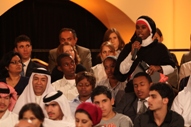 AUDIENCE (F)
AUDIENCE (F)
Salaam aleikum. I'm Shehad from Sudan. My question is for the motion. Can you really ignore the history that we've had with civil wars in the presence of presidents, and how can we guarantee that without a president that poverty and a nearly collapsing Sudan will occur again?
TIM SEBASTIAN
OK, Ahmed Hussain Adam.
AHMED HUSSAIN ADAM
Yes, what I would like to say is that having, you know, a president like Al Bashir, it's not going to help to develop our country, it's not going to help, you know, to promote any kind of human rights. I think that Sudan will be better off if ...
TIM SEBASTIAN
He did allow in a huge humanitarian effort, before he threw them out. He did allow in a huge humanitarian effort, didn't he?
AHMED HUSSAIN ADAM
I think that for the Sudanese people and for the international communities to stand for this, otherwise if you are appeasing him, because he's blackmailing everybody. He's blackmailing the people of Darfur, the people of Sudan, the entire international community, by expelling these humanitarian organisations. I think the right position is to stand up to Al Bashir.
TIM SEBASTIAN
OK, all right, Ghazi Atabani.
GHAZI ATABANI
Whether we like him or not, it's a fact that he is the president who had the courage to sign the most important and the most significant peace treaty - that is the Comprehensive Peace Agreement, and if he had the right partners on your side, he could have signed another agreement like that one in Darfur. The problem is, we don't have a partner, frankly speaking. With the south, we could reach an agreement which brought the country recognition and brought it peace and what we are saying is exactly this: if you hand over the same person who's supposed to be the guardian of this peace agreement, you are throwing the whole country into chaos.
AHMED HUSSAIN ADAM
Yes, I would like to say, it wasn't a choice, you know, for Al Bashir to sign the CPA or the comprehensive agreement. [It was] because of the pressure of the international community and because the pressure of the Bush administration, this is number one. Number two, the status of the implementation of the CPA is not going well. They are fighting each other right now, the SPLA and the National Congress.
TIM SEBASTIAN
OK, I understand. I want to go back to the questioner.
AUDIENCE (F)
No, I'm asking you: can you ignore the history that we've had civil war in the presence of a president? What do you think that Sudan will be without a president? It will be more damage and more brutal bloodshed.
TIM SEBASTIAN
Is that what you think?
AUDIENCE (F)
Yes.
TIM SEBASTIAN
On the basis of what?
AUDIENCE (F)
Our history. We've had presidents, and in the presence of the presidents we've had civil war, resulting in no more than poverty and a nearly collapsed Sudan.
TIM SEBASTIAN
Could it be worse than it has been?
AUDIENCE (F)
Yes, without a president.
AHMED HUSSAIN ADAM
The reality is because you are having this president, that you are having war..
TIM SEBASTIAN
Roland Marchal, you have a point here.
ROLAND MARCHAL
I wanted to remind you of two things which are I believe important. The first one is, in Darfur for a couple of years, we had the most important humanitarian operation. More than twelve thousand humanitarian workers were trying to deliver aid to the Darfurians. It wasn't enough but certainly it was much more than what many expected before at a certain point in the crisis. It was achieved thanks to international pressure. It was achieved as well because Sudanese - even officials from the regime - were supportive of that move. The second thing: you have to look at the ICC. The ICC is splitting the humanitarian world. Why? Because for humanitarian organisations, the access to victims is primordial, it's the prime objective of their work, so now collaborating with the ICC means that of course they are barred [from functioning] normally in Sudan and certainly in other conflict area, so it is affecting the very idea of humanitarianism.
TIM SEBASTIAN
OK, I'm going to take a question from the gentleman right at the back please, you sir.
AUDIENCE (M)
Well, good evening. My name is Mohamed and I'm from Sudan. Mr. Ahmed Hussain, I think that you are away from Sudan, you are living in London and you are talking about a situation in Darfur. You are not an eye-witness, you are, looks [to] us, you see that in Jazeera or the BBC. OK, my question: you say that it's good for Sudan to hand over the Sudanese president. According to what you say, that it's good for Sudan, and you know that Sudan is not a member of this ICC, and how we can hand [over] our president, and we are talking about the president and not a single one in Africa.
TIM SEBASTIAN
So what is your question please?
AUDIENCE (M)
My question is, according to what do you say, that it's good for Sudan. It's not good for Sudan, maybe it's good for you but it's not good for Sudan. Thank you.
AHMED HUSSAIN ADAM
Of course first of all, I don't want to go into personal issues but I was in Darfur, I just came back from Darfur on 1st February, you have to know this. I was in Darfur in the desert of Darfur, this for sure. But also we don't want to have this president who is killing our people right now. If you want to support this president, OK, support him, but I don't want to support him to continue killing our people as we speak right now.
TIM SEBASTIAN
OK. I just want to ...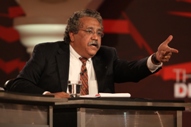 HANI SHUKRALLAH
HANI SHUKRALLAH
Just very briefly, I do not understand, I'm still puzzled by the argument that crimes can be committed and not prosecuted but we should not prosecute these crimes because they will complicate things on the ground. I mean, this is basically what you are saying (points to Dr Atabani). You are admitting that crimes have been committed, gross human rights violations, war crimes, but we should not prosecute them because they complicate things on the ground. I find this morally reprehensible.
TIM SEBASTIAN
OK, you made the point, you made the point, you've made it twice now. Can I just have that gentleman back, the questioner, please.
AUDIENCE (M)
Yes, my question is we are on an international channel, it's not true to say that it's good for Sudan. It's not good for the whole of Sudan.
TIM SEBASTIAN
All right, we've got your opinion, thank you very much. I'm going to take a final question. Lady in the fourth row.
AUDIENCE (F)
My question's for the opposition. One of your main points, there was the fact that the ICC is not equipped enough to handle this case. Who do you suggest is well equipped to do so instead?
TIM SEBASTIAN
Where are you from?
AUDIENCE (F)
I'm from Sudan.
TIM SEBASTIAN
Thank you.
GHAZI ATABANI
Well, that's a very good question. Actually one of the criticisms that have been levelled at the ICC was that it was trying to deliver a Western-style justice. Well, we would say, without prejudice to the right of individuals who prosecute whoever might be responsible for crimes, including the president, we have to remember that even according to the Rome Statute, the intervention - that's assuming we recognise it - the intervention of ICC should be on the basis of complimentarity, that is precedence ...
TIM SEBASTIAN
OK, she was asking who.
GHAZI ATABANI
National judiciary - recently when we were visited by a committee from the African Union - we said to them we can have special tribunals, we can have it as a transparent process for prosecuting people - but that's not my point. That's an important aspect of seeing justice being done, but what's more important to us in Africa is reconciliation. You know the model, the experiment of the South Africans, because when you're having ...
TIM SEBASTIAN
I don't think you're answering the question.
GHAZI ATABANI
No, the question is, it's two sides.
TIM SEBASTIAN
Who is going to try people?
GHAZI ATABANI
National tribunals.
TIM SEBASTIAN
They'll put President Bashir on trial?
GHAZI ATABANI
He has no substantive immunity. The president doesn't have substantive immunity in the constitution.
AHMED HUSSAIN ADAM
He has, he has.
GHAZI ATABANI
He doesn't. He has procedural immunity like any other president anywhere in the world, because you don't take presidents every morning to the police station. You have to go through a certain procedure.
TIM SEBASTIAN
I'm going to take a word from the questioner again please.
AUDIENCE (F)
Well my point was that if the ICC is not equipped enough to do so, should this problem be ignored simply because ...
GHAZI ATABANI
No, no.
AUDIENCE (F)
Then who else should take responsibility to judge this case?
AHMED HUSSAIN ADAM
The national judiciary, the national tribunal, the national judiciary. That is what the Rome Statute says.
TIM SEBASTIAN
You don't seem very impressed by that.
AUDIENCE (F)
No, it's just... isn't that controlled by Al Bashir?
GHAZI ATABANI
No, it's not, it's not, it's an independent judiciary. It's an independent judiciary, just like in any other country. It's an independent judiciary but on top of that, the government expresses its willingness to make it as transparent as possible to anyone who wishes to...
TIM SEBASTIAN
Ahmed Hussain Adam, come back on this.
AHMED HUSSAIN ADAM
First of all, I think that the judiciary in Sudan is unwilling and unable because you don't have any laws to proscribe war crimes and crimes against humanity and genocide, this is for sure, one. Al-Bashir has absolute immunity under Provision 60 of the interim constitution of Sudan, especially under one case which is treason and treason has to have three quarters of the parliament. This is number one, number two ...
TIM SEBASTIAN
All right, you've made your point, you've made your point.
AHMED HUSSAIN ADAM
One point, just one point.
TIM SEBASTIAN
Very briefly, then we're going to wrap it up.
AHMED HUSSAIN ADAM
The authority of investigation rests on the minister of justice and the minister of justice is under the control of the president ...
ROLAND MARCHAL
One point.
TIM SEBASTIAN
One point, very brief point, Roland Marchal.
ROLAND MARCHAL
We haven't talked very much about other African cases. For instance many Ugandans are complaining against the ICC, not only because the ICC indictment of the Lord's Resistance Army's leaders have made peace impossible, but as well because they have the feeling that they are basically providing a ground test to improve the ICC and they don't feel very happy with that because that's their life at stake.
Vote result
TIM SEBASTIAN
OK, you've made the point. Ladies and gentlemen, we have come to the point when we're going to vote on the motion that 'This House believes that Arab states should hand over the Sudanese president to the International Criminal Court'. If you would take please your voting machines. Let me just explain how they work. If you want to vote for the motion, that is the side represented by Ahmed Hussain Adam and Hani Shukrallah, you will be pressing button one, the ‘yes' button. If you want to vote against the motion, the side represented by Ghazi Atabani and Roland Marchal, you will press button two, the ‘no' button, and whichever button you want to press, please do it now. You only have to press once. Your vote will be sent immediately to our computers and we should have the results for you very shortly. All right, here is the vote. There it is, 55 percent for the motion, 45 percent against. The motion has been carried. All it remains for me to do is to thank our distinguished speakers for coming. Thank you very much indeed, and thanks to you, the audience as well. The Doha Debates will be back again next month. Till then from all of us on the team, have a safe journey home, good night. Thank you for coming, good night.
Watch online

